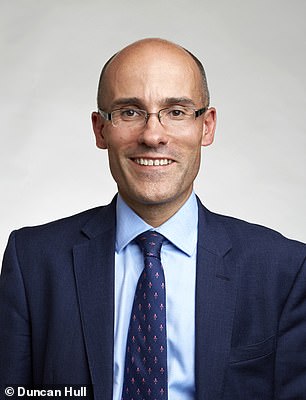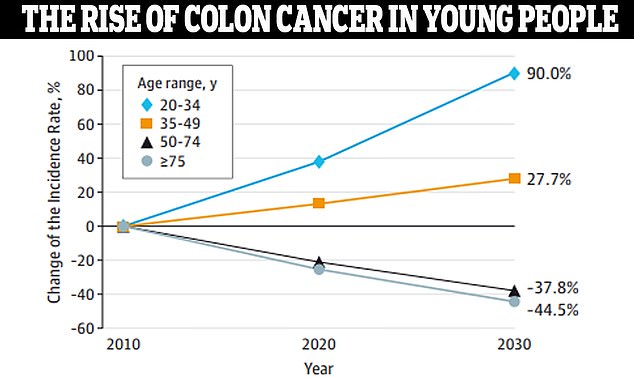Colon cancer is becoming more common in children, warns world’s leading expert – and her explanation will alarm you
It’s a phenomenon that has doctors around the world baffled: colorectal cancer, usually a disease of older people, has increased by 50 percent over the past 30 years in people in their 20s, 30s and 40s.
In a fascinating conversation between two of the world’s leading cancer experts, a new theory has now been put forward to explain the trend.
While acknowledging that there are likely “multiple” contributing factors, top specialists have suggested that a common childhood infection could be partly to blame.
In an interview with The Health Foundation, Dr Charles Swanton, Cancer Research UK’s chief clinical officer, spoke of ‘new data’ showing that a specific type of the bacteria E. coli ‘may contribute to at least some of the cancer initiation processes.’
He added that the infection, which leads to food poisoning symptoms, has been shown to cause mutations in blood vessels in the intestines that can promote the development of tumors.
Colon cancer can cause you to have blood in your stool, a change in your bowel movements, a lump in your bowel that can cause an obstruction. Some people also suffer from weight loss as a result of these symptoms


Top cancer doctors Kimmie Ng (left), a specialist in oncology and director of the Young-Onset Colorectal Cancer Centre at the Dana Farber Cancer Institute in Boston, and Charles Swanton (right), chief clinical officer at Cancer Research UK, discuss what’s behind this worrying rise
Dr. Kimmie Ng, an oncology specialist and director of the Young Colorectal Cancer Center at the Dana Farber Cancer Institute in the US, echoed Dr. Swanton’s comments.
She replied: “That finding is really provocative and very interesting,” adding that the infection likely occurs “very early” in a person’s life.
This is which is consistent with our hypothesis that any exposure or precipitating factor likely occurs early in life.’
This theory is supported by Dr. Ng’s disturbing claim that many of her colorectal cancer patients are actually children.
Dr. Ng said she is seeing more children with the disease in her own clinic than ever before.
“While there isn’t necessarily published data on the rate of increase and whether it’s affecting the pediatric population, at least anecdotally I’ve seen children with colorectal cancer,” she said.

Data from JAMA Surgery shows that the number of colon cancer cases is expected to increase by 90 percent in people between the ages of 20 and 34.
She added that thyroid cancer is also on the rise, as is kidney cancer, a disease that is also becoming more common in young people.
The type of E. coli that the experts identified is a specific strain known as PKS-positive E. coli.
It is not linked to food poisoning, but is thought to arise through interactions with the trillions of microbes in our gut.
Scientists don’t know exactly how PKS-positive E. coli develops, but a 2022 study found a link between the presence of the bacteria in colorectal cancers and a Western diet.
A 2020 study A study published in the journal Nature found that a person’s risk of developing colon cancer may be increased after being infected with this specific type of E. coli.
Scientists believe the bacteria — thought to affect up to one in five people — releases a toxin that can damage the cells lining the gut. The study says that over time, this could potentially turn some cells cancerous.
While our junk food-heavy diets, smoking and obesity are often blamed for the rise in cancer, experts say it is these subtle changes in gut bacteria that likely play a major role.
Dr. Ng says her experience shows that many of her patients are young and not obese.
Many young people with colon cancer lead healthy, active lives, suggesting that obesity is not the only cause of the increase in cases.
“A lot of them are triathletes and marathon runners, so it’s really a mystery why this is happening,” she said.
‘I mean, the hypothesis that’s being put forward there is that the reason why the incidence of all types of digestive tract cancer is increasing, the common theme is that obesity is a risk factor.
‘But I have not seen that myself in the patients I have cared for.’
Dr. Swanton added that while many scientific studies indicate that obesity is a major risk factor in early development of colorectal cancer, he suggests that this is not always the case.
He said: ‘My impression, at least clinically, is that this argument doesn’t always hold water, and that many of these cancers at a young age are associated with people who are not obese or overweight.’
MailOnline has repeatedly reported on the global increase in bowel cancer among young people.
Perhaps the most recognizable victim of this trend is Deborah James, also known as the “bowel babe.” Diagnosed at just 35, she raised millions for charity in her final days in 2022.
Analysis suggests that the number of deaths from bowel cancer in the UK will increase by 2,500 a year between now and 2040.
Meanwhile, the number of people in the UK diagnosed with the disease is set to increase by around a tenth over the same period.
Currently, nearly 17,000 Britons die from bowel cancer each year, and only half of those diagnosed are expected to survive ten years after diagnosis.
